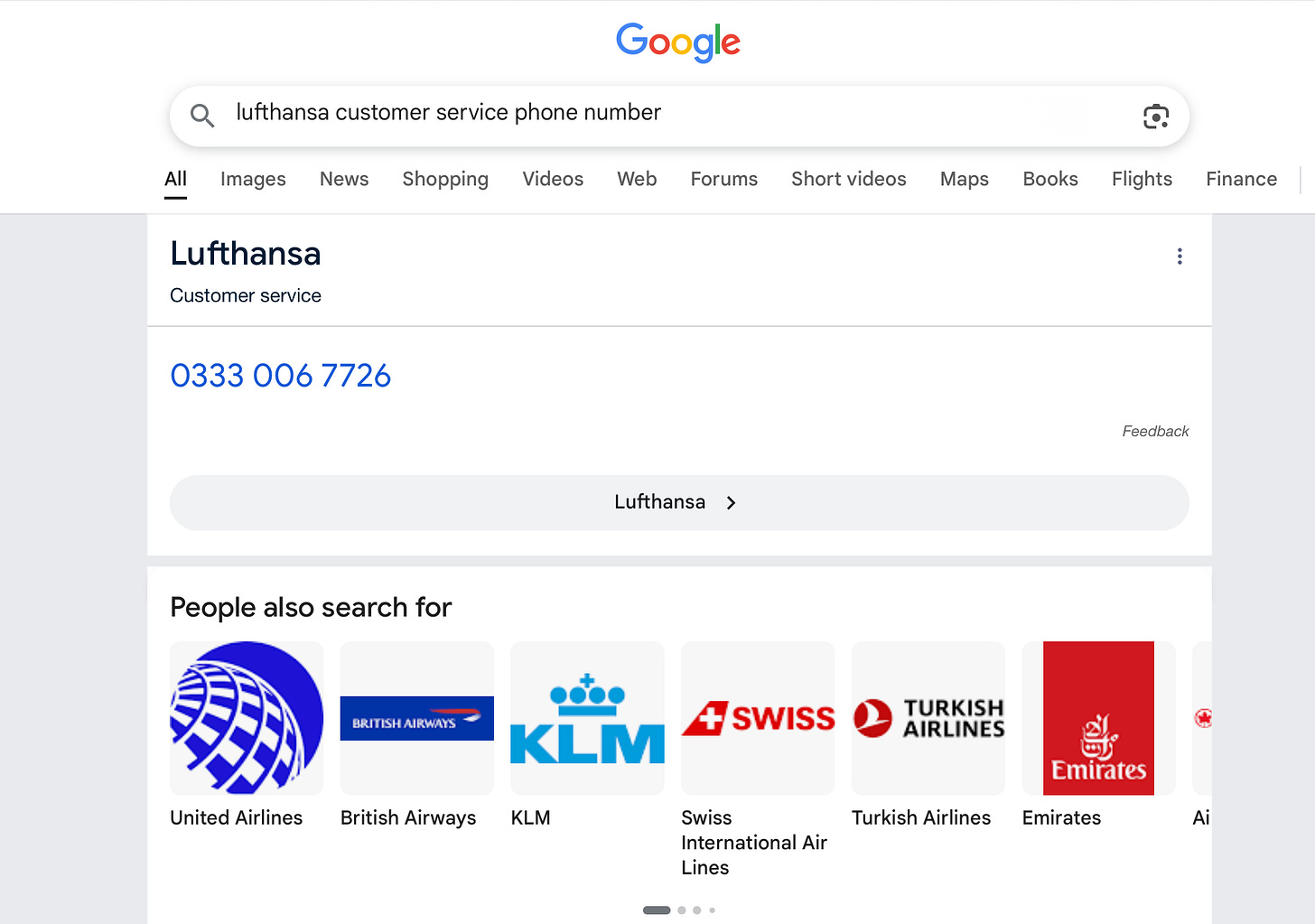Some Google AI Results Are Leading to Phone Scammers - What You Should Know
How fraudsters turned Google’s helpful AI into their marketing tool
Picture this: It’s Monday morning, your internet dies mid-Zoom call, and your boss is waiting for that presentation you worked on all last week. You frantically Google “Comcast customer service number” and Google’s helpful AI Overview serves up a phone number with the confidence of a GPS that’s never led anyone astray. You dial, a friendly voice answers, and twenty minutes later you’ve handed over your Social Security number to what turns out to be a very convincing scammer.
Welcome to 2025, where AI has become the perfect accomplice for phone scams.
The New Scammer’s Playbook
Recent reports reveal that Google’s AI Overviews have been serving up fake customer service numbers that lead straight to scammers’ phone lines. One user searching for Swiggy food delivery support got connected to fraudsters trying to steal money through screen-sharing tricks. Another nearly lost credit card details to fake Royal Caribbean support. The most frustrating part? Many of these companies don’t even offer phone support - only chat or email.
Internet outages drive 31% of calls to telecom companies, making desperate customers perfect targets. When your connection is down and you need it fixed now, you’re not exactly in the mood to verify phone numbers through multiple sources.
AI: The Ultimate Information Parrot
Here’s the uncomfortable truth that tech companies don’t advertise: AI doesn’t fact-check, it aggregates. These systems are sophisticated parrots, repeating whatever they’ve learned from the internet’s mix of legitimate information and complete garbage.
When AI encounters an “information gap”—not enough reliable data about a specific query - it starts grasping at digital straws. It pulls from user-generated content, random forums, and yes, even strategically planted scam numbers that have been optimized to fool both algorithms and panicked humans.
Scammers Game the System
Modern phone scammers have evolved beyond buying Google ads - they’re now poisoning AI training data. By flooding the internet with fake contact information that mimics legitimate business patterns, they’ve essentially turned AI into their unpaid marketing department.
The sophistication is genuinely scary. These aren’t the obvious “Nigerian prince” scams of yesteryear. Today’s fraudsters study real customer service scripts, learn industry terminology, and can perfectly mimic everything from shuttle booking details to billing procedures. As one victim noted: “They tricked me into sharing my credit card info, and I spotted the fraud just in time.”
Your Emergency Action Plan
Bookmark official numbers before you need them. When your internet is down, your TV is glitching, or your credit card is acting up, you’re not thinking clearly. Having verified contact information saved ahead of time eliminates the dangerous Google scramble.
Look for red flags during the call. Legitimate customer service rarely asks you to share your screen, download remote access software, or “verify” your account with full credit card details. If something feels off—like they’re pushing you to act quickly or asking for unusual information—hang up and try again through official channels.
Use the source links in AI results. Google’s AI Overviews typically include citations. Click through to the actual company website instead of trusting that conveniently provided phone number floating at the top of your search results.
My Privacy Toolset
This list contains apps I use daily and highly recommend based on my testing and experience. I will update this page when something changes on my end.
The Reality Check
Google reportedly knows about the scam number problem and claims to be working on fixes, but until then, we’re all unwitting beta testers in the AI customer service experiment. The company has “taken action” against identified fake numbers, but new ones pop up faster than a game of digital whack-a-mole.
The bigger issue isn’t just Google - it’s our collective trust in AI-curated information. We’ve become so accustomed to instant, accurate answers that we’ve forgotten to question the source. AI systems can’t distinguish between a legitimate Sprint customer service number and a scammer’s spoofed listing that’s been SEO-optimized to appear authentic.
The New Rules of Digital Survival
I once stayed at an Airbnb in Tennessee where the security company had a sign that read: “In God We Trust. All Others We Monitor.” That’s exactly the mindset we need for AI-generated information.
Verify. Every single time. That phone number AI confidently presented? Double-check it against the company’s official website. That “customer service representative” asking for your banking details? Hang up and call back using a number you’ve independently verified.
Remember: AI is incredibly useful, but it’s not infallible - it’s more like that overconfident friend who gives directions while secretly using a broken GPS. In 2025, the most dangerous scam isn’t the obviously fake email about lottery winnings - it’s the perfectly legitimate-looking AI result that’s actually a digital trap.
Your financial security depends on staying one step ahead of algorithms that can’t tell the difference between help and harm.




